MELBOURNE, Feb 1 (Reuters) - The state government of Queensland does not hold a financial bond to cover rehabilitation costs for Australia's Queensland Nickel refinery (QNI), a government official said, suggesting tax payers may end up footing the bill if QNI goes under.
A prolonged slump in nickel prices CMNI3 , which hit the lowest since 2003 at $8,100 per tonne last month, has pushed QNI into financial difficulty. The refinery, owned by independent politician Clive Palmer, went into voluntary administration in January after failing to secure government support in December.
Administrator FTI Consulting has said QNI would need capital to stay in business beyond April, failing which it could be forced to shut shop. the state does not hold a financial assurance bond, the company's environmental authority contains conditions to ensure that rehabilitation is conducted in accordance with ... (department) guidelines," a spokesperson for the Department of Environmental and Heritage Protection told Reuters.
In the absence of a bond, taxpayers could be left with a bill which FTI estimates may run into tens if not hundreds of millions of Australian dollars.
This has prompted the Queensland government to review regulation around when it may require companies not directly involved in the resources sector to pay an assurance bond, said the spokesperson. QNI is a metals producer and not a miner.
However, if QNI receives funding, taxpayers could be spared.
A capital injection could come from a consortium of Palmer-led entities, while the administrator has also received approaches from many other parties.
"The future of the refinery is not clear and statements regarding future management of the site should the refinery close would be premature at this stage," the spokesperson said.
The department declined to give an estimate for rehabilitation costs in the event of a liquidation.
In 2009, then-owner BHP Billiton (L:BLT) BHP.AX had projected clean up costs for QNI, including redundancies and full-site rehabilitation, at $1.4 billion, before it sold the refinery to Palmer later that year, according to The Australian newspaper.
By last year, projected costs had shrunk to $42.5 million, according to QNI's 2015 report, from $330 million previously after the refinery decided it could rehabilitate the site to an "industrial use" standard instead of returning it to an original, undisturbed state, according to local media.
Queensland Nickel is one of Australia's biggest nickel refineries with a capacity of 35,000 tonnes a year.
